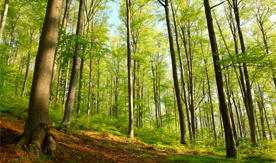
UMaine Forestry Researchers’ Study Gives Voice to Often Overlooked Group
Despite financial challenges and contrary to long-held misperceptions, Maine’s low-income woodland owners share a sense of stewardship based on a love of their land, rarely viewing their acreage as an investment, according to a study conducted by forestry researchers at the University of Maine.
UMaine graduate student Britt Townsend and professor Jessica Leahy led the study to learn more about this often underrepresented group. They determined an affordable and interactive program offering advice from professional foresters would be welcome and beneficial to this group.
Leahy, associate professor of human dimensions of natural resources in the School of Forest Resources, and Townsend interviewed 20 low-income landowners around the state in the summer of 2012. The research is part of Townsend’s master’s thesis in forestry.
Little scientific research on low-income landowners exists, and according to Townsend and Leahy, this is the first study in Maine to focus on this group. With the highest percentage of private land ownership in the United States and some of the highest poverty rates, the state provides an ideal setting for the study, according to the researchers’ final technical report, “Listening Beyond the Choir: Finding the Voice of Low-Income Landowners in Maine.”
In the report, Townsend and Leahy list eight recurring themes from the interviews with landowners. Those themes are: Strong connection with the land; property tax concerns; desire for autonomy in the management of one’s land; strong community ties; desire for wilderness or conservation; active trial-and-error learning of management practices; temporal and financial constraints as limiting factors to desired management practices; and preference for “walk-and-talk” and other interactive outreach methods.
While doing research on land management decisions and recreational access with the UMaine Center for Research on Sustainable Forests, Leahy determined the low-income group had been underdocumented. She also found a lot of stereotypes about the group exist, such as not having an emotional connection to the land, harvesting timber when times get tough and not having the same ethics as wealthier owners.
“Whenever you hear assumptions as a researcher you get curious,” Leahy says, adding to her drive to pursue the study.
On average, study participants own 83 acres of forestland and have for 16 years, and 65 percent purchased their land, while the rest inherited it. None of the participants said they were members of a forest organization.
“Love of the land” was the most popular reason participants owned land, while “having something to own,” was second. Other reasons included legacy, hunting, privacy, freedom and happiness, according to the report.
“For those interviewed, their land was not an investment — it was a passion,” the report states.
Despite varying reasons for ownership, nearly all participants share a strong connection with the land and said selling it would be one of the last things they would do.
“We found this group is highly attached to their land and they don’t view it as a savings account,” Leahy says.
Property taxes present the greatest challenge for most of the owners, with many fearing they could lose their land. Tree growth tax incentives were cited by some as providing relief from high tax burdens, while others weren’t aware of the incentive or actively resisted it for fear of government control. A high percentage of participants sought little outside intervention in the management of their lands, the researchers found.
Even with money concerns, many of the participants turned down the $75 offered for their part in the study, Leahy says.
“They would say, ‘It was great to be able to talk about my land with someone for an hour, and I would feel weird taking the money,’” she says.
Leahy says she and Townsend had difficulty recruiting enough participants and had the most luck through ads on Uncle Henry’s and Maine’s Craigslist.
Half of the participants said they have harvested timber from their property, and 40 percent said they would harvest in the future. Researchers also found 15 percent of participants have a written management plan for their land and ranked themselves a two on a scale of one to five for their forestry knowledge.
Even without written plans, most owners are still active in managing their lands, having been self-taught through trial-and-error methods. Nearly all participants agreed there is room for improvement and would welcome advice on better practices, but cited lack of time and money as inhibitors.
Landowners expressed a preference for “walk-and-talk” outreach programs with a forester, but felt it would be unaffordable. With 17 public foresters statewide, Maine lacks a system that could provide those services on a large scale, the report states.
“With 17 foresters and 80,000 family forest households, there isn’t enough of them to go around,” Leahy says.
Townsend and Leahy see a need for free or inexpensive information that could cater to this group. The researchers suggest offering an internship program through the University of Maine and University of Maine Cooperative Extension where forestry students — guided by a faculty member — could provide landowners with the one-on-one interaction they seek, creating a valuable service for them and the students.
Based on the participants’ strong ties to their rural communities, community information sessions led by professional foresters is another possibility the researchers would like to explore. Leahy says she will follow up to determine the specific needs of this group and how best to structure potential programs.
This research is important because it relates to UMaine’s mission as a land grant university to provide information to all residents of Maine, not just the wealthy ones, Leahy says. The study could also shatter the biases held about low-income landowners by documenting this group’s views.
“What we found was that the low-income landowners were not that much different from other landowners,” Leahy says. “How much they loved their land, how they enjoyed puttering around, how their land was one of the most important things they own are common thoughts among all Maine landowners.”
Contact: Elyse Kahl, 207.581.3747
